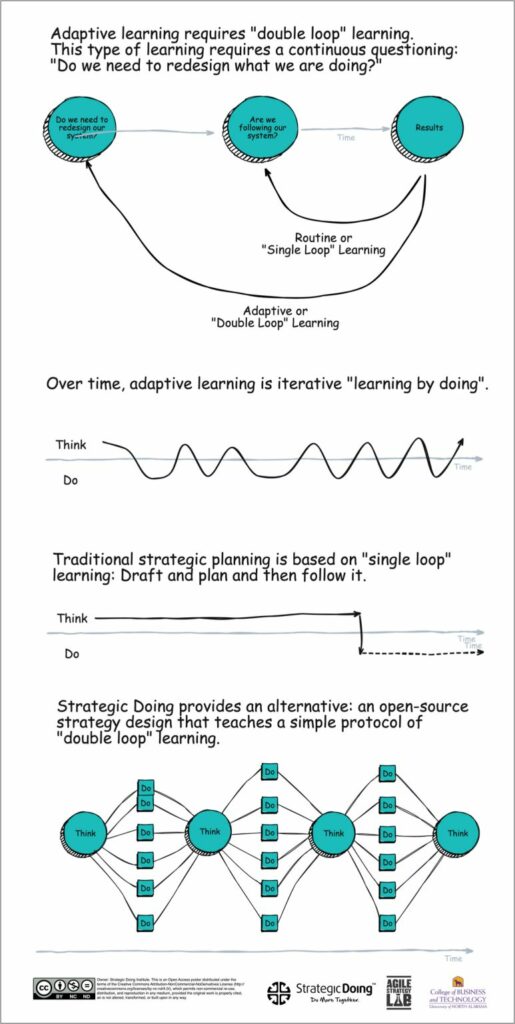Adapting through Knowledge & Learning
Let’s start here: Knowledge and learning are critical to adaptation. Both guide our actions as we respond to our environment.
By learning by doing, we generate new knowledge. With a continuous process of designing and doing, we can continue to adapt and thrive.
Unfortunately, our current organizations frustrate this process. Unless we begin redesigning them, our capacity to adapt to new situations will continue to wither.
WHY ORGANIZATIONAL OBSTRUCTIONS MATTER
Corporate America’s inability to implement effective learning processes helps explain why companies have run into trouble in more volatile environments.
No wonder “creative destruction” became a hot topic over the last few decades.
We only need to look at major stock indices. “The average duration of a company’s tenure on American indices has been trending down for decades” (Visual Capitalist: https://bit.ly/3FIipMV).
Companies that don’t adapt disappear.
Think Blockbuster. Or, on the eve of its major restructuring: General Electric (See https://bit.ly/3iVyfeg).
DIG DEEPER: ROUTINE v. ADAPTIVE LEARNING
We are all familiar with routine learning. We start with a plan, act, and evaluate our results based on the plan.
If our results deviate from what we expect, we make adjustments in what we do. We don’t question the plan. We question whether we followed the plan. Our organizations are stuffed with standard processes that rely on routine learning. “It’s how we do things around here.”
Adaptive learning is different.
We start with a plan, we act, and we see our results. If our results deviate from what we expect, we ask a different question. Do we need to change what we are doing? Do we need to redesign our system?
STRATEGY AS A ROUTINE PROCESS
When we understand the difference between routine and adaptive learning, we can see why traditional strategic planning has become less productive.
Most strategy planning processes follow a linear logic. They rely on single-loop learning. Metrics measure deviation from the plan, but the plan doesn’t change. There is no room for learning by doing.
It’s not surprising that in many organizations, strategic planning has become a stale budgeting exercise.
STRATEGY AS AN ADAPTIVE PROCESS
Strategy as an adaptive process is designed differently. It is based on adaptive learning in which teams regularly convene to assess what they have learned by doing.
As they distill their learning, team members adjust to what they are doing. They redesign their strategy.
THE CORE QUESTION
So here’s the core question: is your strategy process designed to be routine or adaptive?
FURTHER READING
Argyris, C. (1977). Double loop learning in organizations. Harvard Business Review, 55(5), 115-125.
Nonaka, I., & Konno, N. (1998). The concept of “Ba”: Building a foundation for knowledge creation. California Management Review, 40(3), 40-54.
Nonaka, I., & Takeuchi, H. (2007). The knowledge-creating company. Harvard Business Review, 85(7/8), 162.


The Founder of the Lab at UNA and co-author of Strategic Doing: 10 Skills for Agile Leadership, Ed’s work has focused on developing new models of strategy specifically designed to accelerate complex collaboration in networks and open innovation. He is the original developer of Strategic Doing.
